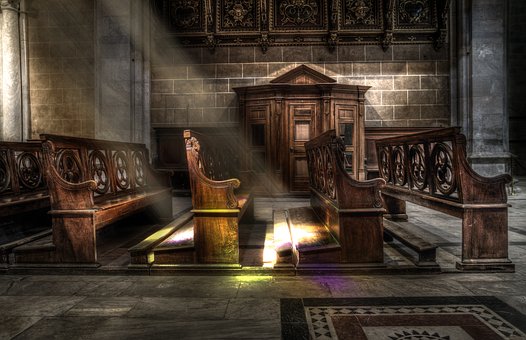A sensitive topic like this always requires a bit of an introduction or disclaimer, whatever you want to call it. First of all, I want to establish that I am an atheist and that I have never been religious. Therefore I do not know entirely what it feels like to put faith in a higher power, not since I was an eight-year-old praying for his dog not to die. All I am going off of in this article will be observations of the many religious friends and family members that I have, as well as some of the atheist ones, in order to make a comparison and determine, if possible, which course of spirituality tends to attract people who might be considered “weaker” people. I will address the notion that religion is a catalyst for war separately.
Is religion for the weak
With that said, the first obvious error implied in the question, “is religion for the weak”, is the assumption that every religious person is religious for the same reason. It would be arrogant to think that one mentality rules across the board for every single individual that claims a religion, a number that is in the billions worldwide. So we must put in the position that we must say we are going off of why “most” religious people are religious and why “most” non-believers do not believe. This is a tricky and easily blown process, so I am going to attempt to do it with great care for not taking any assumptions too far, and only drawing conclusions that I believe are warranted and legitimate.
I am of the belief that faith decisions are not made in ignorance.
I believe people thoroughly think through their faith in their deity of choice and re-affirm it in their minds quite often. There seems to be an illusion among some lifetime non-believers that those who proscribe themselves to religion only do so out of sheer ignorance, or that they have never thought about the logic of it all.
 This seems like a ridiculous notion to me. While some fair-weather Christians (or people of other faiths, although the lack of devotion seems less common among those faiths) may not give thought to their beliefs, it is hard to imagine that truly religious people do not think through the ideologies that they give themselves over to.
This seems like a ridiculous notion to me. While some fair-weather Christians (or people of other faiths, although the lack of devotion seems less common among those faiths) may not give thought to their beliefs, it is hard to imagine that truly religious people do not think through the ideologies that they give themselves over to.
So for the sake of the rest of this argument, I am going to assume that our faithful masses have all thought through their decision to be religious. The somewhat slanted title of this group of articles suggests that religion is for the weak. However, if we are operating under the assumption that those who have made what we atheists like to call the “leap of faith”, then does it not actually take more mental fortitude to have faith in a higher power than it does to have faith in things that clearly exist around us? Does it not take more strength and devotion to make a claim that can never be proven than only ones that can easily be proven on a day to day basis?
The idea that religion is for the weak is based on the premise that religious people could not live without their faith holding them up. If that is true, if religious people do “need” their faith, just think how impressive that really is. It cannot be an easy thing to do, to not rely on yourself and your own mind for your upkeep, but to put faith in something else over even yourself. I think we tend to disregard the substantial commitment to an idea that the religious have and the mental strength it takes to do such a thing.
 Atheists, by comparison, take no mental leap of faith, they stay secure in their own minds and choose not to pledge themselves too closely to any ideology that may not be provable. So on that comparison, the truly dedicated religious would seem to have an edge in mental fortitude. However, it is worth noting, with regard to my previous claim that people are not religious/atheists/agnostics choose their faith for many different reasons. There is the possibility that most atheists are atheists because they do not have the fortitude to jump to an impossible to improve conclusion, but we also must acknowledge that many atheists or agnostics have faith in themselves and have thought their faith through quite thoroughly and are very secure in their belief that a God does not exist. I would say that these people on comparison are most likely every bit as mentally developed as the most intelligent faithful.
Atheists, by comparison, take no mental leap of faith, they stay secure in their own minds and choose not to pledge themselves too closely to any ideology that may not be provable. So on that comparison, the truly dedicated religious would seem to have an edge in mental fortitude. However, it is worth noting, with regard to my previous claim that people are not religious/atheists/agnostics choose their faith for many different reasons. There is the possibility that most atheists are atheists because they do not have the fortitude to jump to an impossible to improve conclusion, but we also must acknowledge that many atheists or agnostics have faith in themselves and have thought their faith through quite thoroughly and are very secure in their belief that a God does not exist. I would say that these people on comparison are most likely every bit as mentally developed as the most intelligent faithful.
So we see that mental fortitude really has very little stock in whether a person is religious or not. The most we can say is that with more mental fortitude, a person will be more devoted to either their faith or their sureness of mind that no God exists. Sorry Agnostics.
The notion that religion is a catalyst is a true one, but not one that is really significant if that makes sense. Religious differences do indeed drive people towards killing each other. But then again, so does nationhood, region (Deep South vs New England), personal relationships, food, children, water, cars, horses, furbies and everything else in the world!
People will always find a way to be angry at each other.
If anything the existence of religion has at times stemmed what may well have been a much larger tide of cruelty in the world. Of course, it has also instigated great movements of death. But ultimately, the existence of religion does not significantly affect violence levels around the world, even if it is given as the reason for that violence.






